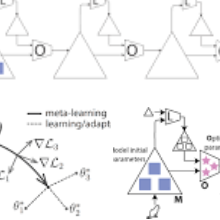We introduce a tensor-based model of shared representation for meta-learning from a diverse set of tasks. Prior works on learning linear representations for meta-learning assume that there is a common shared representation across different tasks, and do not consider the additional task-specific observable side information. In this work, we model the meta-parameter through an order-$3$ tensor, which can adapt to the observed task features of the task. We propose two methods to estimate the underlying tensor. The first method solves a tensor regression problem and works under natural assumptions on the data generating process. The second method uses the method of moments under additional distributional assumptions and has an improved sample complexity in terms of the number of tasks. We also focus on the meta-test phase, and consider estimating task-specific parameters on a new task. Substituting the estimated tensor from the first step allows us estimating the task-specific parameters with very few samples of the new task, thereby showing the benefits of learning tensor representations for meta-learning. Finally, through simulation and several real-world datasets, we evaluate our methods and show that it improves over previous linear models of shared representations for meta-learning.
翻译:我们引入了一种基于压力的共享代表模式,用于从一系列不同任务中取而代之。学习线性代表模式的先前工作假设,不同任务之间有共同的共享代表,不考虑额外的特定任务可观察到的侧面信息。在这项工作中,我们通过一个可以适应所观察到的任务特点的3美元标准来模拟元参数,我们建议了两种方法来估计基本任务特征。我们建议了两种方法来估计潜在的微粒。第一种方法解决了数以万计回归问题,在数据生成过程的自然假设下工作。第二种方法使用额外分配假设下的时间方法,在任务数量方面增加了样本复杂性。我们还侧重于元测试阶段,并考虑估计新任务的具体参数。从第一步开始估计的数以10美元为模型,使我们能够用极少的新任务样本来估计具体任务参数,从而显示学习数以方表示元学习的好处。最后,我们通过模拟和几个真实世界数据集,评估了我们的方法,并表明它比以往的元学习的共同代表模式改进了以往的线性模型。



